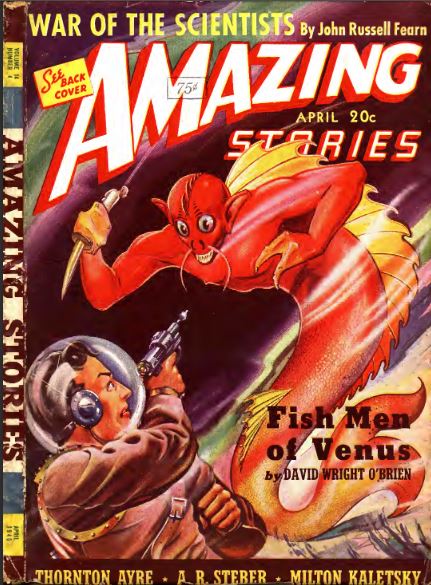Retro-Reading: Pulp Fiction and Fish Men of Venus
Posted by Rampant Coyote on November 18, 2015
When I saw the April 1940 cover over at the Amazing Stories magazine digital archive, I had to read it. “Fish Men of Venus.” How could I not? It’s like Mystery Science Theater 3000 fodder, but in short-story form. And considering my mood over the weekend, I really needed a story about fish-men from Venus.
SPOILER WARNING! – It was just as awesome and as bad as I imagined it. Which is to say, pretty much standard pulp fair, and nothing that would be likely to pass editorial muster today from a reputable publisher. But it’s nowhere near Eye of Argon bad, and not as bad as some of the crap you can find self-published on Amazon these days. (BTW, that is NOT a dig at self-published books… just that, as with all things indie, the lack of gatekeepers means both wonderful and terrible things.)
This was published long after the magazine had changed hands and was no longer being edited by Hugo Gernsback (of whom the Hugo awards are named), but had instead had embraced the conventional pulp stories Gernsback avoided. The author was a young man and the nephew of one of the pulp editors. Sadly, he died only a few years later, in World War II, killed in a bombing raid over Berlin.
Many of the problems stem from a dated style and use of language, like the use of passive voice (one of my own worst vices!) and quaint word choice. I don’t think I’d want to read a modern story involving a “vibrator pistol.” And of course, technology and science change. It’s hard to accept the idea today of Venus being covered with oceans and populated by fish-people. And some of is just downright implausible, like the part where, being held at gunpoint the hero managed to move to the wall, grab a previously unmentioned fire extinguisher, and hit his captor over the head with it. How he managed to do all that in less time than it would take to pull a trigger, I don’t know. And there’s the whole idea of everybody being convinced by a confession obtained under duress and a death threat.
But whatevah. Not every pulp writer could be Heinlein, Lovecraft, Burroughs, or Chandler. And had David O’Brien survived the war and continued his writing career, maybe his work would have improved. Partly because of these regular periodicals full of short stories, the entire art form evolved and generally improved over time. Those lessons were learned in a competitive marketplace before the advent of other forms of entertainment – particularly paperback novels, comic books, and television.
The pulps were, by their nature, the low-end of the writing / reading scale. Which isn’t to say their stories were necessarily inferior, and it certainly doesn’t mean the writers were. But they bought the stories on the cheap, manufactured magazines with the cheapest-quality paper they could, and sold it at a price that undercut the “slicks.” And at one point, particularly between the world wars, they dominated the newsstands. At the time, writers(often with several pseudonyms) might shop a story around to higher-paying venues first, but if there were no bites there, they could sell to the pulps.
 Just as I like retro-gaming, I enjoy some retro-reading, too. While I can’t say I’ve uncovered a ton of lost gems or anything, I’ve discovered some fun little stories in some forgotten genres. Like… aviation stories! There was a whole genre of aviator fiction back in the early 20th century. This was from the days when flying was new and pioneering, and Charles Lindbergh was a hero. Awesome-sauce.
Just as I like retro-gaming, I enjoy some retro-reading, too. While I can’t say I’ve uncovered a ton of lost gems or anything, I’ve discovered some fun little stories in some forgotten genres. Like… aviation stories! There was a whole genre of aviator fiction back in the early 20th century. This was from the days when flying was new and pioneering, and Charles Lindbergh was a hero. Awesome-sauce.
I guess that was another advantage of the pulps… they were cheap enough to go after a niche.
Is there any value reading these old stories? I would assume so. I would hope so. I know there are some gems out there – after all, I grew up reading the works of Robert E. Howard and H. P. Lovecraft, both pulp authors. And I’m a more recent fan of Richard Matheson, who also wrote for pulps in the early days.
I don’t know if the pulps are full of fresh ideas – they certainly fell into their own ruts – but there are some very inventive and weird ideas, just as there are today. Maybe to modern eyes, they feel fresh, but I can’t say the modern “genre fiction” field feels staid and stuck in a rut. At least not the stuff I read. Maybe I’m just not jaded enough yet. But the older stories do have a different feel, and a different language. They can still be fun to read.
And I don’t think there are many modern stories being written about Fish-Men of Venus. So there’s that.
Filed Under: Books - Comments: Comments are off for this article
